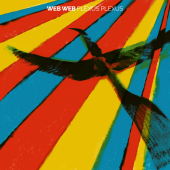
Web Web
Plexus Plexus
Label: Compost
Genre: Jazz / Avant Garde
Availability
- CD Digi / Cardboard €16.99 Out of Stock
This time, WEB WEB in their original line-up (without Max Herre) have (again) chosen a special guest: JJ Whitefield (The Poets Of Rhythm / Karl Hector & The Malcouns / Syrup), who contributes the fantastic guitar sound. His riffs are sometimes funky as with the Poets Of Rhythm or Syrup, or more psychedelic as with Karl Hector & The Malcouns or his many live and studio recordings with Embryo. The sound color of his guitar gives the album the thrust into the wonderful atmosphere of spacey jazz-kraut bands of the seventies. The concept of the album should be the exact opposite of the previous WEB MAX album (WEB MAX II): Back to the (WEB WEB) roots, with spontaneous, improvised pieces, fragments, ideas that mean the greatest possible liberty and live spirit.
And the idea of bringing JJ Whitefield on board was just as unpredictable and improvised: one day before the session, Roberto Di Gioia thought to himself: "JJ and I have always lived in Munich. But unfortunately, we've never really crossed paths. I'm a great admirer of his art, his music, his way of playing. He is so inspiring because he doesn't compromise. He plays in his own way, he's not a copy of anyone or anything."
So Roberto spontaneously called JJ and asked him if he could imagine playing on one or two songs. JJ immediately said yes, and a day later he was in the studio. They actually only played two songs: One lasted 25 minutes, the other 45 minutes. And most of the tracks (apart from a few others without him) for the album "Plexus Plexus", which means something like: Network, interweaving.
The 14 compositions were created over two days, recorded by Jan Krause (Beanfield) in Munich. The energetic live session lasted twice 10 hours, and everyone - Roberto Di Gioia (Rhodes, Fender Precision Bass, Moog, Mellotron, percussion), Christian von Kaphengst (Fender Precision Bass, Rhodes), Peter Gall (drums, percussion, Fender Rhodes), Tony Lakatos (tenor saxophone, flute) - was "on fire" to the core. The musicians switched instruments to create a completely different overall sound: Kaphengst on Fender Rhodes sounds different to Roberto, his playing has a different harmonic structure, and Roberto on bass is familiar from numerous Max Herre recordings, or from Till Brönner's album "Till Brönner", and of course also from the "Let Yourself Be Loved" by Joy Denalane, which he produced and which was released on Motown Records.
